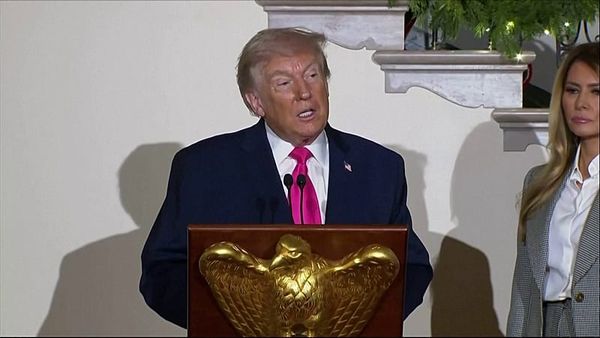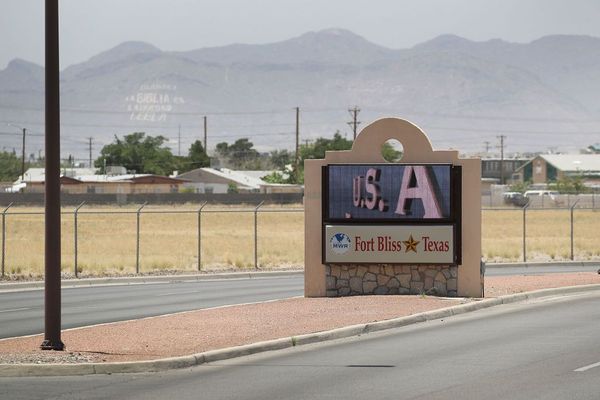Ruben Studdard and Clay Aiken, who were 24 years old when they became two of “American Idol’s” biggest stars, are starting to sound an awful lot like a couple of old men.
Or, at least, like a couple of middle-age men. It escalated quickly.
As they settle onto a Zoom call — for an interview to promote their 20th-anniversary reunion concert tour — Aiken mentions that Studdard is squeezing this in between music courses he teaches at the University of Tennessee at Chattanooga, where the former “Idol” champ is a full-time faculty member.
So, one naturally has to ask Studdard if his students are aware that he won the show back in 2003, when it was the most-watched show on television in Amer —
“They have absolutely no idea who I was. No,” says the now-44-year-old Studdard, cutting off the questioner.
“They weren’t born, were they?” chimes Aiken, also 44, who was Season 2’s runner-up. “Maybe.”
“They were not born,” Studdard continues, shaking his head and closing his eyes. “I have one student who is an older gentleman in my class, and he’s the only person that knows about ‘American Idol.’ He’s a veteran, so he started school late. But the rest of them have absolutely no idea. They couldn’t care less.”
Then, he adds, as a smile blooms on his face: “I actually did a lesson one day on the show, so that they could understand who I was.”
“It’s a little bit depressing,” Aiken concludes, though he’s now smiling, too. “We actually realized a week or so ago that we were now, currently, older than Simon and Paula were when we were on the show, when they were critiquing us,” referring to former “Idol” judges Cowell and Abdul, then 43 and 40, respectively.
In case you’re wondering, Studdard has put out seven albums since “American Idol,” but none since 2018. Aiken recorded six albums in the nine years after the show, but zero since “Steadfast” was released 11 years ago.
They’ve evolved in ways fans might not have expected. Studdard has shifted much of his focus to higher education. Aiken, a University of North Carolina at Charlotte alum and Raleigh resident, mostly retired from the entertainment biz and unsuccessfully ran for U.S. Congress seats representing North Carolina districts in 2014 and 2022.
One thing that hasn’t wavered, however, is their going-on-two-decades-old friendship.
And in fact, the “Twenty Years | One Night” tour represents their third major collaboration as pals who like to perform together, having also done a loosely similar road show in 2010 and a Christmas show on Broadway in December 2018. Studdard and Aiken spoke with The Charlotte Observer recently about their close relationship and how it (and Aiken getting fed up with politics) birthed this new tour, while also reflecting on “Idol’s” good-old days.
The conversation has been lightly edited.
Q. So I was in my late 20s when you guys were on it, and “American Idol” was obviously a huge deal back then. I stopped watching probably after Season 11. Its power and influence over pop culture seemed to be changing. I mean, that show just felt different in those earlier seasons. You guys obviously still have a connection to the show. I saw that you’re both gonna be on this season’s finale. Does the show feel different now?
Studdard: When I go back there — and I’ve been back a lot — I feel like an elder statesperson. And that’s not a bad thing. But it is interesting, because I remember when we would go back early on, and you kind of still felt like a contestant. Then as I got older, it starts to feel like you’re everybody’s uncle. I mean, these people, their parents are our fans. ... Their parents were the ones that voted for us. Not the contestants.
But we still have a lot of information to give (as guest mentors). The show, still, is pretty similar. It’s run kind of the same way. So, I think that Clay and I are an invaluable resource to Fox.
Aiken: It’s on ABC now, Ruben.
Studdard: Oh, ABC — sorry. Not Fox. ABC.
Aiken: See, that’s how much it’s changed over the years! But you know what? The fact that it has changed networks speaks to its permanence in American media. I mean, I’ve compared it — maybe wrongly — but I’ve compared it to Miss America in the past. Miss America used to be the thing you expected every year. Still is going on, obviously. “Idol” is sort of that. I mean, Kelly Clarkson was Miss “American Idol” 2002, Ruben Studdard “American Idol” 2003. And so on. I’ve always said they should do it (by number) — “American Idol 21,” or whatever.
I went back this year, myself, to mentor, and had almost exactly the same experience as Ruben. In fact, one of the girls who I was mentoring, her mother had waited in line to audition with me in Atlanta. She didn’t make it through. She went and had a wonderful life, and children, and one of those children, who she had well after she stood in line with me, is now on “Idol” this season. It was hilarious. Kind of depressing.
I mean, he’s right: We are elder statesmen when we go back, in a way. But it’s amazing how much the industry has changed. Back when we were on, (the format was) text message or call in to vote. Now it’s on the computer. The contestants audition on Instagram, they audition via Zoom, like this. So it’s a different show.
But what it continues to do is what it did for Ruben and I. It allows young people to change their life, it allows them to dream. I don’t know if I’ve told you this story, Ruben, but when I went back to the Hollywood Week this year, as I was waiting to be checked in to the hotel, there was a young contestant who was showing up for Hollywood Week at the desk next to me. He had a guitar on his back and he was talking to the lady at the counter, so excited — “Oh, yeah, I’m here, today’s such and such, and then tomorrow we’re gonna sing, and then if you make it through you get to” — he was telling her about how it goes, and I had this crazy flashback to when we checked in for Hollywood Week ourselves. I checked in, and I’m sure I did the same conversation with the lady at the Glendale Hilton. I checked myself into the Glendale Hilton, and that was probably the last time I checked myself into a hotel for a decade.
And I thought, as he was standing there, this could be the last time he has to check himself into a hotel. His life could change after this week, in the same way ours did. At that Glendale Hilton. I got chills thinking about it, how much potential “Idol” has to do that for kids, to let ’em hope and dream that they can be the next Kelly Clarkson, or Ruben or Clay.
Q. Speaking of the show changing people’s lives: When you think back to your experience in 2003, can you pinpoint a moment when you actually had a feeling that your life was going to change?
Studdard: I knew it was about to be different when I was in the room with Clive Davis (then chair and CEO of RCA Records). I knew the music business. I knew about Clive. A lot of people go to “American Idol” not really knowing the behind-the-scenes people. But I remember, very vividly, seeing Clive Davis on “Entertainment Tonight” maybe a couple of months before I auditioned. He was introducing Alicia Keys on “Entertainment Tonight,” and I said to my roommates: “I’m gonna meet him one day.” And I remembered that moment as soon as I walked in that hotel when we all were on camera meeting Clive Davis. I was like, Man! I told these people last year I was gonna do this, and I’m actually doing it.
So that show, man, the amount of access that we had to people like Lamont Dozier, Gladys Knight, Verdine White — those are people with huge careers that we were able to get to glean little bits of knowledge from, and that is invaluable.
Aiken: But did you know it when it was happening? Did you realize it while it was going on?
Studdard: I understood the gravity of the meetings.
Aiken: I don’t think I did. When it’s happening, everything around you is moving. We worked so hard. We were on that show every day. Our day off was the day we shot the Ford commercial. That was the only day we didn’t have to worry about the show. It wasn’t until probably several years later when I looked back and realized, Holy crap. I am in Sweden right now. I mean, things moved so quickly that it took awhile after the first album cycle — maybe into the Christmas album for me (November 2004’s “Merry Christmas With Love”) — that I finally was able to see this was not a flash in the pan. This was not just a summer camp experience — something we do, and then we go home and it’ll go back to our normal lives. We never went back to “the normal life.”
Q. Can you talk about expectation versus reality, as it relates to what you thought the future held at the time? I mean, I imagine a 24-year-old who wins a show like “Idol” envisions the albums and the tours, some fame and some fortune, like you guys have had. But Ruben, right now you’re also teaching college music courses. Clay, you tried to enter politics on a large scale. Do you think, if not for the show, that you guys would have gone in these sorts of directions?
Studdard: Well, I was gonna be a teacher anyway. When I left Alabama A&M (in 2000), slightly prior to finishing my degree in music education, I promised my mom if I didn’t make it in five years, I would go back to school. Literally three years to the day I told my mama that, I won that show. And I was sweating bullets, ’cause I was like, Man, I’m gonna have to go teach.
And now look at me. I’m teaching! My mom thinks that is the most hilarious thing. Even now, she’s like, “Before you and Clay go on the road, I’m coming to UTC. I gotta come sit in your class and watch you, ’cause you said you were never gonna be in nobody’s classroom.” (Editor’s note: Studdard did go back to school, eventually earning a master of arts degree from Alabama A&M University.)
Aiken: I wonder if that means that we always are destined for what we’re destined for, regardless. Because if we could find my mom’s old IBM PS/1 from 1992, you would find posters that I made on Print Shop of me running for Congress. Of what my sign would be. I was fascinated by it. My eighth-grade class project was to interview and write an article about somebody who you admire. And I hunted down Terry Sanford, who had just lost his Senate race, and I interviewed him, and wrote my story about him. So it’s interesting that we both, in a way, ended up in similar places to where the “middle-school us” thought we might be.
I would say this: I may have tried to run for Congress had it not been for “Idol.” But I never would have been able to. I mean, granted, I wasn’t successful. But I never would have been as successful as I was — or had the ability to even do it — had it not been for “Idol.” Ruben, I don’t know; maybe you would have been teaching, but maybe not at a great college like you are.
Studdard: I was just enamored with my arts teachers. Everybody that taught me something in the arts, they were all my favorite teachers. Even to this day, they are still some of my favorite people in the world. And I wanted to be that version of that for some child. That was my dream — to be that, for somebody else.
Q. But you both still have some sort of itch that needs to be scratched when it comes to being on a stage, right?
Aiken: Ruben’s itch for performing has never gone away, and may never go away. Mine definitely went away, but strangely has returned, and I’m kind of pumped for it now.
Q. So whose idea was this tour?
Studdard: I think that we both discussed the possibility of it for years.
Aiken: Yeah, we toured together in 2010 and really enjoyed it, and realized we’d like to do something together again. I’m the one who said “no” for a while, because I took the detours that I took. We went back and did a show on Broadway in 2018 together, largely because I went out and saw Ruben’s “Ruben Sings Luther” show and caught the bug again — told my manager, “OK, I really want to perform with him again. Let’s figure something out.” So we did a Christmas show on Broadway that year.
But Ruben was very helpful to me in both my campaigns. He’s the only person in the entertainment world who came out and supported me in both of them. He came out to this one in Durham last year, and this one did not go the way I wanted it to. So when the campaign ended, I just decided, f— politics. They’re not helping anybody. Neither side. And I just had this realization that I felt great about myself when I went and saw Ruben sing, and people enjoyed our Christmas shows, maybe if I actually want to help people, maybe the better thing to do is shut up about politics — because they’re all full of s— — and instead just go and sing, and do something happy. I mean, Ruben had always been saying, “We should do something.” And after the campaign was over, one of the first calls I made was to say, “OK, let’s do it. I’m done with this crap forever! Let’s go sing.”
Q. What’s are the differences between this tour and the one you guys did together in 2010?
Studdard: Honestly, the tour is probably gonna look a little similar. Probably in some ways much better, because we have more technology, more things that we can do now that we couldn’t do 10 years ago. We have less people. I know that for sure, because technology has given us the opportunity to travel with less people. Also, the set list is fire, fire, fire. If you like old-school music, you gonna have a good time at our show. We leanin’ into our childhood to play the ’80s and ’90s. We’re giving ’em the best of ourselves in those eras right there.
Aiken: There is old-school music. We’ll still do some stuff that we both recorded also. But our “Timeless” tour was a little more regimented. We started in the ’60s and we worked our way through decades of music. I think this show is a much more authentic and real look at both of us — as people, and as fans of music. Because it was created based off of really just a natural jam-session-type conversation. We sat down in Birmingham with our music director, and Ruben and I just talked about our memories of 2003, and “Idol,” and the things that he loved about it. From each of those stories that we were sharing with each other came musical moments that were very natural. I just love the way this show was put together, because it was so organic in its development. People are going to have this opportunity to really reminisce and have the nostalgia of 2003, and relive that magic. They’re gonna get to know us in ways that maybe they haven’t in the past.
And I think why we perform very well together is that we trust each other on stage. If one person goes left, the other goes left, too. We trust each other, and that makes performing so much easier with each other. I’ve been backstage at “Idol” in years after ours where I could literally hear people trying to trip the other one up. That never happened with our season. We’ve never really been competitive with each other. In the entertainment world, a lot of times people need to be number one, or number two. We joke about that all the time. But neither one of us necessarily feels the need to have more solo lines than the other, or sing more songs than the other. We enjoy performing together. We put on whatever we think is the best show.
Now Ruben’s gonna remind you that he won and I lost.
(Studdard and Aiken both laugh.)
———







